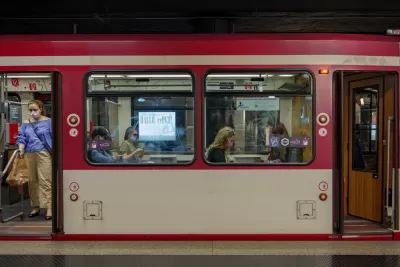Beginning Dec. 16, all of Germany will be subject to stricter coronavirus restrictions to reduce infections following a meeting with the chancellor and the 16 state governors. Schools will close and restaurants will be confined to take-out service.

Much like the new coronavirus restrictions in California that took effect on December 7, Germany is taking strong action to reduce viral spread and spare hospitals from being overwhelmed.
"The health system is under heavy strain and our aim has always been to avoid an overloading of the health care system," Chancellor Angela Merkel told Deutsche Welle (DW) on December 13.
Germany's intensive care unit capacity is also at a critical level, and doctors have warned that only 5% to 10% of intensive care beds are available in some parts of the country.
U.S. comparison
A major difference between restrictions in Germany compared to California is that Chancellor Angela Merkel is taking action much earlier than any American governor has done in this phase of the pandemic.
Berlin-based Frank Jordans reports for the AP (source article) on the rise in the daily new cases from two weeks ago to a seven-day rolling average of 26 cases per 100,000 people on December 13 (per The New York Times global tracker). According to the Harvard Global Health Institute's Key Metrics for COVID Suppression, when case incidence exceeds 25 per 100k, stay-at-home orders are recommended.
By contrast, the United States is averaging 63.3 cases per 100k as of December 13 according to the Times U.S. tracker
Like three of the five regions of California subject to the new Regional Stay Home Order (posted here), the German restrictions will shut down outdoor dining, the subject of current litigation in Los Angeles County, and personal care services, including salons and barbershops.
California, with the nation's highest infection growth rate of 1.26 on December 13, according to Covid Act Now, is averaging 79 cases per 100k; Los Angeles County at 108 per 100k.
Rhode Island lesson
Rhode Island continues to lead the nation with 107 cases per 100k. In a recent post, Providence-based GoLocalProv contributor, Nick Landekic, put the blame for the state's outbreak on "the mismanagement of the crisis by our political leaders."
Close downs work. They are the only thing that works in the pandemic, and especially when the situation has been allowed to get as totally out of control as it has in Rhode Island.
Government aid promised
Unlike the United States, where Congress has been unable to agree on funding a follow-up to the CARES Act, "Germany's finance minister...promised financial support for businesses and individuals affected by the stricter measures," according to DW. The new restrictions will be in effect until at least January 10.
Related in Planetizen:
- California Judge Berates L.A. County Public Health Department in Outdoor Dining Ruling, December 14, 2020
- Pandemic Geography: What's Wrong in Rhode Island? December 13, 2020
-
England Begins Second Lockdown to Protect the National Health Service, November 8, 2020
-
Coronavirus Success Stories, June 8, 2020
FULL STORY: Silent nights: Germany tightens virus lockdown over holidays

Maui's Vacation Rental Debate Turns Ugly
Verbal attacks, misinformation campaigns and fistfights plague a high-stakes debate to convert thousands of vacation rentals into long-term housing.

Planetizen Federal Action Tracker
A weekly monitor of how Trump’s orders and actions are impacting planners and planning in America.

Chicago’s Ghost Rails
Just beneath the surface of the modern city lie the remnants of its expansive early 20th-century streetcar system.

Bend, Oregon Zoning Reforms Prioritize Small-Scale Housing
The city altered its zoning code to allow multi-family housing and eliminated parking mandates citywide.

Amtrak Cutting Jobs, Funding to High-Speed Rail
The agency plans to cut 10 percent of its workforce and has confirmed it will not fund new high-speed rail projects.

LA Denies Basic Services to Unhoused Residents
The city has repeatedly failed to respond to requests for trash pickup at encampment sites, and eliminated a program that provided mobile showers and toilets.
Urban Design for Planners 1: Software Tools
This six-course series explores essential urban design concepts using open source software and equips planners with the tools they need to participate fully in the urban design process.
Planning for Universal Design
Learn the tools for implementing Universal Design in planning regulations.
planning NEXT
Appalachian Highlands Housing Partners
Mpact (founded as Rail~Volution)
City of Camden Redevelopment Agency
City of Astoria
City of Portland
City of Laramie





























